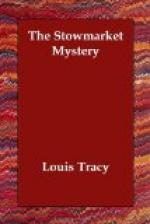“Indeed. What did she say?”
“She hinted that his temper was a reminiscence of his Southern birth, always a sore point with him, and contrasted me with him, to his disadvantage. All very unfair, of course, but, you see, she was the hostess, and Alan had upset her party very much.”
“So you walked home, and resolved to hold out the olive branch?”
“Most decidedly. I was older, perhaps a trifle more sedate. I knew that Helen loved me. There were no difficulties in the way of our marriage, which was arranged for the following spring. Indeed, my second trial took place on the very date we had selected. It was my duty to use poor Alan gently. Even his foolish and unreasonable jealousy was a compliment.”
Brett threw the scrap-book on to the table. He clasped his hands in front of his knees, tucking his heels on the edge of his chair.
“Mr. Hume,” he said slowly, gazing fixedly at the other, “I believe you. You did not kill your cousin.”
CHAPTER III
THE DREAM
“Thank you,” was the quiet answer.
“You hinted at some supernatural influence in relation to this crime. What did you mean?”
“Ah, that is the unpublished part of the affair. We are a Scots family, as our name implies. The first Sir Alan Frazer became a baronet owing to his services to King George during the ’45 Rebellion. There was some trouble about a sequestered estate—now our place in Scotland—which belonged to his wife’s brother, a Hume and a rebel. Anyhow, in 1763, he fought a duel with Hume’s son, his own nephew by marriage, and was killed.”
“Really,” broke in Brett, “this ancient history—”
“Is quite to the point. Sir Alan the first fought and died in front of the library at Beechcroft.”
The barrister commenced to study the moulding in the centre of the ceiling.
“He was succeeded by his grandson, a little lad of eight. In 1807, after a heavy drinking bout, the second Sir Alan Hume-Frazer cut his throat, and chose the scene of his ancestor’s duel for the operation.”
“A remarkable coincidence!”
“In 1842, during a bread riot, the third baronet was stabbed with a pitchfork whilst facing a mob in the same place. Then a long interval occurred. Again a small child became the heir. Three years ago the fourth baronet expired whilst the library windows were being opened to admit the litter on which he was carried from the hunting-field. The fate of the fifth you know.”
Brett’s chair emitted a series of squeaks as he urged it closer to the wall. At the proper distance he stretched out his leg and pressed an electric bell with his toe.
“Decanters and syphons, Smith,” he cried, when the door opened.
“Which do you take, whisky or brandy, Mr. Hume?” he inquired.
“Whisky. But I assure you I am quite serious. These things—”




